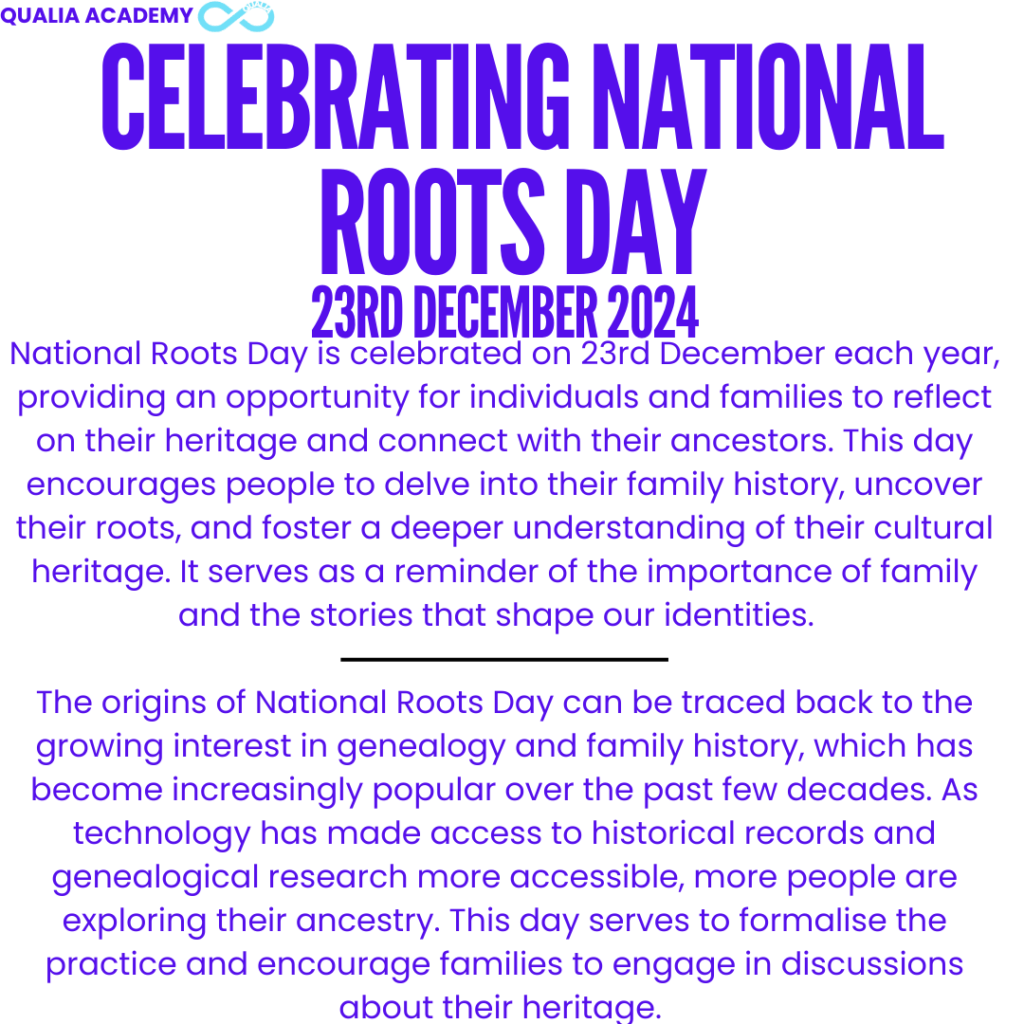The end of December brings with it a unique opportunity to celebrate three special occasions that highlight the importance of family, literature, and togetherness. These events are National Roots Day on 23rd December, Christmas Book Flood on 24th December, and Christmas Day on 25th December. In this blog post, we’ll delve into the significance, traditions, and ways to celebrate each of these days, ensuring that you’re fully informed and inspired to embrace the spirit of the season.
National Roots Day – 23rd December
National Roots Day is celebrated on 23rd December each year, providing an opportunity for individuals and families to reflect on their heritage and connect with their ancestors. This day encourages people to delve into their family history, uncover their roots, and foster a deeper understanding of their cultural heritage. It serves as a reminder of the importance of family and the stories that shape our identities.

Historical Background
The origins of National Roots Day can be traced back to the growing interest in genealogy and family history, which has become increasingly popular over the past few decades. As technology has made access to historical records and genealogical research more accessible, more people are exploring their ancestry. This day serves to formalise the practice and encourage families to engage in discussions about their heritage.
Activities to Celebrate National Roots Day in December
Genealogy Research:
One of the best ways to celebrate National Roots Day is by embarking on a genealogical journey. Use online resources, such as Ancestry.com or Findmypast.co.uk, to trace your family tree. Record the names, dates, and stories of your ancestors, and try to connect with distant relatives.
Family Gatherings:
Organise a family gathering on National Roots Day. Share stories about your ancestors, discuss family traditions, and enjoy a meal that reflects your heritage. This not only strengthens family bonds but also keeps the memory of your ancestors alive.
Create a Family Tree:
Visualise your family history by creating a family tree. Use poster boards or online tools to map out your lineage. Include photos, names, and interesting anecdotes to make it a cherished keepsake.
Visit Ancestral Homelands:
If feasible, consider visiting places that hold significance to your family’s history. This could be the town where your grandparents grew up or a country your ancestors emigrated from. Immersing yourself in these locations can provide a profound sense of connection.
Document Family Stories:
Take time to record oral histories from older family members. This can be done through interviews or casual conversations. Documenting their experiences and stories ensures that future generations will know where they come from.
Engage in Community Events:
Some communities host events on National Roots Day, such as genealogy fairs, workshops, or history walks. Participating in these events can help you connect with others who share similar interests and provide valuable resources for your research.
The Importance of Understanding One’s Roots
Understanding our roots allows us to appreciate our heritage and the sacrifices our ancestors made. This knowledge can instil a sense of pride and belonging, helping us navigate our modern identities while honouring those who came before us. In an increasingly globalised world, recognising our roots fosters a sense of community and continuity.
Christmas Book Flood – 24th December
What is the Christmas Book Flood?
On 24th December, Iceland celebrates the unique tradition of the Christmas Book Flood, known as Jólabókaflóð, where the giving of books becomes a significant part of the festive celebrations. This delightful custom encourages people to gift books to one another on Christmas Eve, creating a culture of reading that resonates throughout the festive period.
Historical Context
The tradition of the Christmas Book Flood began during World War II, when paper was one of the few materials not rationed in Iceland. The custom became increasingly popular in the 1940s and has grown to become a beloved tradition in Icelandic culture. The idea is simple: on Christmas Eve, families exchange books, snuggle up with warm blankets and hot chocolate, and enjoy the joy of reading together.
How to Celebrate the Christmas Book Flood in December
Curate a Gift List:
Start by selecting books for your loved ones. Consider their interests, whether they enjoy fiction, non-fiction, poetry, or children’s literature. A personalised touch, such as a handwritten note explaining why you chose each book, adds meaning to the gift.
Organise a Book Exchange:
Arrange a book exchange party with friends and family. Each participant can bring a book to share, creating a festive atmosphere filled with literary discussion. This can also include a theme, such as a favourite childhood book or a book related to family heritage.
Visit Local Bookstores:
Support local businesses by visiting your local bookstore for gift shopping. Many bookstores also have knowledgeable staff who can provide recommendations based on the recipient’s tastes. The atmosphere of a bookstore during the holiday season is truly magical.
Create a Reading Nook:
Set up a cosy reading nook in your home where everyone can gather to read on Christmas Eve. Incorporate soft lighting, comfortable seating, and a selection of snacks and drinks to create an inviting space.
Host a Read-Aloud Session:
Share the joy of storytelling by hosting a read-aloud session. Choose a beloved book and take turns reading chapters aloud. This is especially enjoyable for families with children, as it fosters a love of reading in the younger generation.
Explore Icelandic Literature:
If you want to embrace the spirit of the Christmas Book Flood fully, consider gifting Icelandic literature. Explore works by renowned Icelandic authors such as Halldór Laxness, Sjón, or Yrsa Sigurðardóttir to introduce a piece of Iceland’s literary culture to your friends and family.
The Impact of the Christmas Book Flood
The Christmas Book Flood promotes literacy and a love for reading, making it a meaningful tradition in Iceland. It encourages families to spend time together, engage in conversations about literature, and share their favourite stories. This custom is a beautiful reminder of the power of books to inspire, entertain, and connect us.
Christmas Day – 25th December
The Significance of Christmas Day
Christmas Day, celebrated on 25th December, is one of the most important religious and cultural holidays in many parts of the world. It commemorates the birth of Jesus Christ and serves as a time for reflection, celebration, and the gathering of family and friends. While it has deep religious roots, Christmas Day has also evolved into a secular holiday celebrated by people of various faiths and backgrounds.
Historical Context
The celebration of Christmas can be traced back to the early Christian church, which established 25th December as the date to honour the birth of Jesus. The choice of this date likely coincided with existing pagan festivals celebrating the winter solstice, making it easier to convert non-Christians. Over the centuries, Christmas evolved to include various customs, symbols, and traditions that vary from culture to culture.
Traditions of Christmas Day
Attending Church Services:
Many people begin Christmas Day by attending church services, celebrating the birth of Jesus. These services often include hymns, prayers, and readings from the Bible. In some cultures, a midnight mass on Christmas Eve is a significant part of the celebration.
The Christmas Meal:
One of the highlights of Christmas Day is the festive meal shared among family and friends. Traditional dishes vary by country but often include roast meats, such as turkey, goose, or ham, along with seasonal vegetables, stuffing, and gravy. In the UK, it is customary to serve Christmas pudding for dessert, often accompanied by brandy sauce or custard.
Gift Giving:
The tradition of exchanging gifts on Christmas Day represents the gifts brought to Jesus by the Wise Men. Families often place presents under the Christmas tree, and the excitement of unwrapping gifts adds to the festive atmosphere. Many people take time to express gratitude for the gifts they receive, reflecting on the love and thoughtfulness behind them.
Decorating the Christmas Tree:
The Christmas tree is a central symbol of the holiday, adorned with lights, ornaments, and sometimes even edible decorations. The act of decorating the tree is often a family activity, with each member contributing to its festive appearance.
Christmas Carols and Music:
Singing Christmas carols is a cherished tradition during the festive season. Families may gather around the piano to sing their favourite carols, or choirs may perform in churches and public spaces. The music of the season adds to the joyous atmosphere, spreading cheer and goodwill.
Acts of Kindness and Charity:
The spirit of Christmas is often associated with giving and compassion. Many people take the opportunity to volunteer, donate to charities, or help those in need during this time. This reinforces the message of love and community that Christmas embodies.
The Importance of Christmas Day
Christmas Day is more than just a holiday; it is a celebration of love, kindness, and the spirit of giving. It fosters connections among family and friends, encourages acts of generosity, and provides an opportunity for reflection and gratitude. For many, it is a time to create cherished memories and traditions that will be passed down through generations.
Ending December On A High Note
As December draws to a close, the celebrations of National Roots Day, Christmas Book Flood, and Christmas Day offer a wonderful way to embrace the festive spirit. Each occasion invites us to reflect on our heritage, share the joy of literature, and connect with loved ones. By participating in these celebrations, we honour our past, foster meaningful connections, and create memories that will last a lifetime. Whether through exploring family history, gifting books, or gathering around









